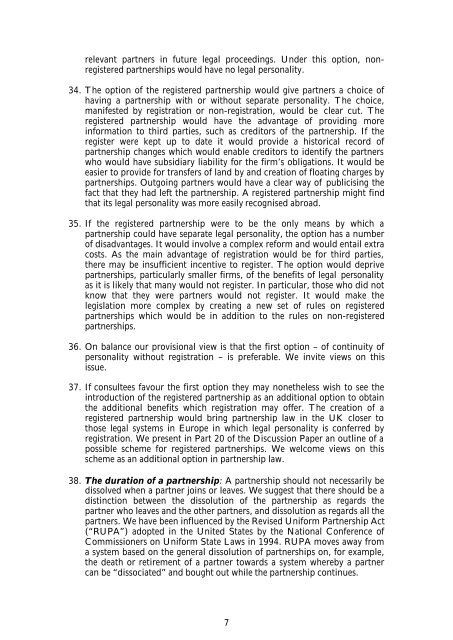Partnership Law Consultation Summary - Law Commission
Partnership Law Consultation Summary - Law Commission
Partnership Law Consultation Summary - Law Commission
Create successful ePaper yourself
Turn your PDF publications into a flip-book with our unique Google optimized e-Paper software.
elevant partners in future legal proceedings. Under this option, nonregistered<br />
partnerships would have no legal personality.<br />
34. The option of the registered partnership would give partners a choice of<br />
having a partnership with or without separate personality. The choice,<br />
manifested by registration or non-registration, would be clear cut. The<br />
registered partnership would have the advantage of providing more<br />
information to third parties, such as creditors of the partnership. If the<br />
register were kept up to date it would provide a historical record of<br />
partnership changes which would enable creditors to identify the partners<br />
who would have subsidiary liability for the firm’s obligations. It would be<br />
easier to provide for transfers of land by and creation of floating charges by<br />
partnerships. Outgoing partners would have a clear way of publicising the<br />
fact that they had left the partnership. A registered partnership might find<br />
that its legal personality was more easily recognised abroad.<br />
35. If the registered partnership were to be the only means by which a<br />
partnership could have separate legal personality, the option has a number<br />
of disadvantages. It would involve a complex reform and would entail extra<br />
costs. As the main advantage of registration would be for third parties,<br />
there may be insufficient incentive to register. The option would deprive<br />
partnerships, particularly smaller firms, of the benefits of legal personality<br />
as it is likely that many would not register. In particular, those who did not<br />
know that they were partners would not register. It would make the<br />
legislation more complex by creating a new set of rules on registered<br />
partnerships which would be in addition to the rules on non-registered<br />
partnerships.<br />
36. On balance our provisional view is that the first option – of continuity of<br />
personality without registration – is preferable. We invite views on this<br />
issue.<br />
37. If consultees favour the first option they may nonetheless wish to see the<br />
introduction of the registered partnership as an additional option to obtain<br />
the additional benefits which registration may offer. The creation of a<br />
registered partnership would bring partnership law in the UK closer to<br />
those legal systems in Europe in which legal personality is conferred by<br />
registration. We present in Part 20 of the Discussion Paper an outline of a<br />
possible scheme for registered partnerships. We welcome views on this<br />
scheme as an additional option in partnership law.<br />
38. The duration of a partnership: A partnership should not necessarily be<br />
dissolved when a partner joins or leaves. We suggest that there should be a<br />
distinction between the dissolution of the partnership as regards the<br />
partner who leaves and the other partners, and dissolution as regards all the<br />
partners. We have been influenced by the Revised Uniform <strong>Partnership</strong> Act<br />
(“RUPA”) adopted in the United States by the National Conference of<br />
<strong>Commission</strong>ers on Uniform State <strong>Law</strong>s in 1994. RUPA moves away from<br />
a system based on the general dissolution of partnerships on, for example,<br />
the death or retirement of a partner towards a system whereby a partner<br />
can be “dissociated” and bought out while the partnership continues.<br />
7

















